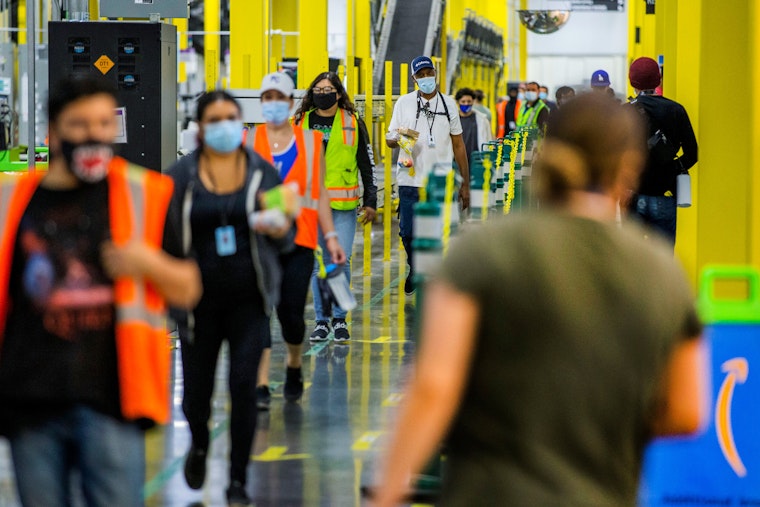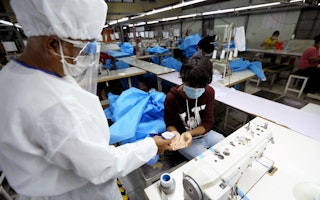Amazon’s Spying Is a Threat to Workers and Democracy
By Matthew Burnett & Monica Greco

This September, Amazon posted two job listings for intelligence analysts to monitor sensitive, confidential topics, “including labor organizing threats against the company.” The listings also called for tracking funding and activities connected to campaigns against Amazon. Following public outcry and scrutiny from civil rights and worker organizations, the corporation called the posts an “error” and removed them from their website.
This blatant, if inadvertent, admission of anti-union surveillance is just the tip of the iceberg—Amazon surveils its workers, its consumers, its detractors, and has built a massive infrastructure for community surveillance by police and other government agencies. At the same time, a movement is growing to counter this all-encompassing, multipronged surveillance empire. Among other efforts in the United States and beyond, Athena—a coalition of more than 50 worker and community organizations—is on the frontlines of this fight, working across issues and hand-in-hand with communities and workers disproportionally affected by Amazon’s antidemocratic and anti-union efforts.
Amazon’s surveillance of its workers is constant and uncompromising. In June, workers at Amazon’s JFK8 warehouse on Staten Island, with legal representation from Make the Road New York and others, filed a lawsuit against the company for putting employees at risk of contracting COVID-19 by continuing to enforce its “Time off Task” and rate policies, putting workers, their families, and the community-at-large at increased risked of COVID-19 infection. (The Open Society Justice Initiative, on behalf of the Open Society Policy Center, represents 16 members of Congress who filed an amicus brief in the case.)
As a result of this ongoing lawsuit, Amazon was forced to inform workers for the first time of a nationwide corporate policy that warehouse employees would not be disciplined for taking time to wash their hands, clean workstations, or perform other COVID-19 safety precautions. Yet even after admitting that almost 20,000 of its workers (by its count) contracted COVID-19 and current spikes in infections in most U.S. states, Amazon has recently reinstated its former policy, ostensibly to meet the demands of Prime Day and its upcoming peak season. Over 40 civil rights groups are now demanding that lawmakers intervene to stop Amazon from using its “Time off Task” and rate tracking system to monitor and retaliate against workers.
Its suite of worker surveillance tools includes a patented wristband that tracks workers’ every move and a new “Distance Assistant” software that uses artificial intelligence-enabled cameras to warn workers if they are not socially distancing, a tactic that predictably limits workplace organizing. Amazon has also recently been caught spying and monitoring organizing in a closed Facebook group for Flex Drivers. Taken together, the lengths to which Amazon has gone to surveil its workers has astonished even long-time security industry veterans [PDF].
Amazon is also in the business of helping state and federal agencies surveil communities with consistent disregard for civil liberties. Take the company’s facial recognition software Rekognition: Despite its record of misidentifying women and people of color, Rekognition has been developed with an eye towards selling to police and other government actors, including meetings with Immigration and Customs Enforcement, threatening to make the already dire problem of racial profiling even worse. Organizations like the Surveillance Technology Oversight Project are exposing and fighting back against facial recognition corporations and calling for local governments to ban the use of these discriminatory technologies.
Following the police killing of George Floyd, Amazon issued a statement purporting to be in solidarity with the Black community and issued a one-year moratorium on Rekognition by police. Simultaneously, it continued full-steam ahead building partnerships with law enforcement around another surveillance product: Amazon’s Ring. Sales of Ring, a home-security camera system, have skyrocketed, putting eyes and ears in millions of doorways and homes. Ring is also seeking U.S. government approval for a home surveillance drone and has integrated Ring with its Neighbors app, which allows not just police but whole communities to monitor local crime, encouraging racial profiling. The data gathered from this unprecedented dragnet it not just for private use, but to surveil entire communities: over 1,400 law enforcement agencies have partnered with Amazon for access.
It doesn’t stop with the local police—Amazon and subsidiaries are helping to “fuel deportation” [PDF] and Immigration and Custom Enforcement’s efforts to criminalize and terrorize immigrants. Companies like Amazon and Palantir, through multi-million-dollar contracts, provide cloud storage and data services enabling the Department of Homeland Security to evade local “sanctuary” policies that protect the rights of immigrants. Organizations like the Immigrant Defense Project and Just Futures Law have joined with Mijente’s #NoTechForICE campaign to call out the alliance between tech companies and agencies that undermine civil and human rights.
It should be unimaginable that a single corporation can be as harmful as Amazon in so many ways, from abusing workers and reinforcing racist policing to supporting deportation and potentially targeting protestors. Amazon is a threat to the health, safety, and livelihoods of the most vulnerable and least protected. It is also a threat to open society and our democracy. Its surveillance empire erodes and undermines core democratic values: freedom of speech, equality and nondiscrimination, respect for privacy, and human dignity.
Amazon, while you deny and obfuscate the scope and detriment of your surveillance empire, we state clearly and for the record that we are also watching you.
Athena, Make the Road New York, Surveillance Technology Oversight Project, Immigrant Defense Project, Just Futures Law, and Mijente are grantees of the Open Society Foundations.
Until November 2021, Matthew Burnett was a senior policy officer for legal empowerment with the Open Society Justice Initiative.
Monica Greco is a senior program manager with the Office of the Vice President at the Open Society Foundations.


